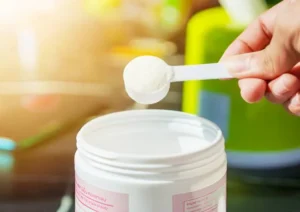What Is Collagen and How Does It Work in Our Body System?
Introduction to Collagen
Collagen is the most common protein in our bodies.
It helps keep everything strong and stretchy, acting like the glue that holds us together.
You’ll find it in your skin, bones, muscles, tendons, and ligaments.
As we get older, we produce less collagen, which can lead to wrinkles and joint pain.
Knowing how collagen functions in our bodies can help us take better care of ourselves
and find ways to naturally increase our collagen levels or use supplements.
What Is Collagen?
Collagen is a fibrous protein made up of amino acids like glycine, proline, hydroxyproline, and arginine.
There are over 28 types of collagen, but the main ones you’ll find in your body are:
- Type I: This is found in skin, bones, tendons, and ligaments—about 90% of the collagen in your body.
- Type II: This type is in cartilage and helps your joints.
- Type III: Supports muscles, organs, and blood vessels.
- Type IV: This one’s in the layers of your skin and helps with filtration.
Our bodies naturally make collagen, but things like aging, a bad diet, smoking, and too much sun can lower how much we produce.
How Does Collagen Work in Our Body System?
Collagen is super important for lots of different things in our bodies:
1. Skin Health and Anti-Aging

Collagen helps give your skin its structure and stretchiness. As we age, our collagen breaks down,
which can lead to wrinkles and dryness.
Eating the right foods or taking supplements can help keep your skin hydrated and reduce signs of aging.
2. Joint and Bone Support
Collagen acts like a cushion for your joints, preventing bone-on-bone friction.
Some studies suggest that collagen supplements could ease joint pain
and even help reduce the risk of osteoporosis by boosting bone density.
3. Muscle and Tendon Strength
Collagen helps keep your muscles strong and your tendons flexible,
which can lower the risk of injuries, especially for athletes.
4. Gut Health and Digestion
Collagen has amino acids that can strengthen your gut lining,
which might help with issues like leaky gut and can improve your digestion.
5. Hair and Nail Growth
Collagen can make your hair and nails stronger, less brittle, and can even promote growth.
How to Boost Collagen Naturally
Since our collagen levels drop as we age, here are some simple ways to help your body keep producing it:
1. Eat Collagen-Rich Foods
- Bone broth – Packed with types I and II collagen.
- Fish and chicken – They provide the amino acids your body needs to build collagen.
- Egg whites – Full of proline, which is vital for making collagen.
2. Consume Vitamin C-Rich Foods

Vitamin C is key for making collagen. Try to include:
- Citrus fruits (like oranges and lemons)
- Bell peppers
- Strawberries
- Broccoli
3. Avoid Collagen-Destroying Habits
- Sugar and processed foods – They can damage collagen fibers.
- Too much sun – This can break down collagen.
- Smoking – It reduces collagen production.
4. Take Collagen Supplements
Some good options are:
- Hydrolyzed collagen peptides – These are easily absorbed by your body.
- Marine collagen – Great for skincare.
- Bovine collagen – Good for your joints and bones.
5. Use Collagen-Boosting Skincare
Products with topical retinoids and vitamin C serums can help encourage collagen production in your skin.
Conclusion
Collagen is crucial for keeping your skin youthful, joints strong, and your body functioning well.
By focusing on a diet that supports collagen, avoiding harmful habits,
and considering supplements, you can help maintain your collagen levels and promote long-term health.
Start bringing in some collagen-friendly habits today for a healthier and more vibrant you.
HOSTINGER HOSTING PLAN DISCOUNT CODE

After going over a handful of the blog posts on your web site,
I honestly like your technique of writing a blog. I book marked
it to my bookmark site list and will be checking back
in the near future. Please check out my web site as well and let me know how you feel.
Thực tế cho thấy, các vấn đề về giao dịch tại 188V rất hiếm khi xảy ra. Theo thống kê, tỷ lệ giao dịch có vấn đề chỉ chiếm chưa đầy 0.5%, thấp hơn đáng kể so với mức trung bình ngành là 2-3%. TONY01-16
Hey everyone, heard some buzz about 6gbetcasino and decided to give it a try. It’s got a slick interface and a ton of different games to choose from. Had a good time so far. You can find them here: 6gbetcasino!
Alright folks, ae888fan25 is the place to be if you’re an AE888 enthusiast! Heard they’ve got some sweet deals and updates. Totally worth a look! Find out more at ae888fan25.
Heard some buzz about 888brlbet, but haven’t checked it out myself. Brazil-focused? Worth a look? Share your experiences! Check it out here: 888brlbet
Bạn có thể thoải mái lựa chọn vật phẩm và vũ khí đa dạng để tiêu diệt con mồi hiện ra trên màn hình. 888SLOT Chưa dừng lại ở đó, với hơn 50+ boss khủng sẽ giúp ngư thủ mang về phần thưởng cực lớn với giá trị Jackpot hàng tỷ đồng. TONY12-16
Just got through the jljl3login and wanted to say it was simple. I had no problems which is always a plus. Give it a look at: jljl3login